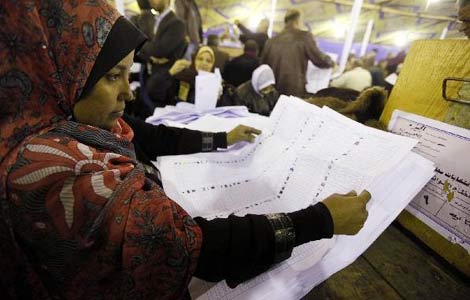Country Report on China's Participation in Greater Mekong Subregion Cooperation
Updated: 2011-12-16 20:11
(Xinhua)
|
|||||||||||
5. Environment
Environmental cooperation is an important component of GMS cooperation, and China highly values its environmental exchange and cooperation with the other GMS countries. First, it has actively participated in and promoted the first phase of the Core Environmental Program "GMS Biodiversity Corridor Initiative (CEP-BCI) (2006-2011)". The initiative mainly aims to establish corridors for biodiversity protection in selected pilot regions and restore or preserve the connections between the existing national parks and the wildlife preserves. China has actively pushed the institutionalization of this project and the related cooperation, and designated Xishuangbanna and the Shangri-la-Deqin region in Yunnan Province as well as Jingxi in Guangxi Autonomous Region as key areas for the project. In April 2011, China successfully held the "Exhibition of GMS CEP-BCI Phase I Achievements in China" in Yunnan Province, which expanded the positive influence of the Chinese participation in the GMS environmental cooperation and the CEP-BCI effort. Second, China has taken an active part in the consideration and formulation of the framework and action plan for the second phase of CEP-BCI (2012-2016).Thanks to their joint efforts, GMS members and the ADB have basically reached consensus on the framework and action plan.
6. Health
Between 2008 and 2010, China continued to implement the pilot projects of cooperative AIDS and malaria prevention and control in the China-Myanmar, China-Laos, and China-Vietnam border regions, and steadily enriched and expanded the coverage of the projects. Between September 2007 and September 2009, the project of cooperative tuberculosis prevention and control in the China-Vietnam border region was successfully carried out. In 2010, China began to implement the project of cooperative prevention and control of dengue fever in the China-Myanmar, China-Laos, and China-Vietnam border regions. The above-mentioned health cooperation projects raised public awareness of the said communicable diseases, led to the establishment of the cooperation mechanisms among the related countries for the prevention and control of infectious diseases, epidemic information sharing, and personnel training, enhanced the links among the health departments of different countries, improved the capabilities of the health staff in the border regions, and lessened the pressure brought by the cross-border transmission of epidemics.
In the past three years, China has held a number of training sessions for the other five GMS countries. Trainees include officials and experts whose duty or expertise was related to the prevention and control of malaria, the monitoring of human infection of highly pathogenic bird flu and Type A H1N1 flu, and professional project management for cross-border health cooperation. In February 2009, China hosted the second GMS public health forum in Guangxi, where the discussion centered on food and drug safety and cross-border prevention and control of infectious diseases.
7. Tourism
In recent years, China has actively implemented the GMS Tourism Sector Strategy, and made dedicated efforts to develop and promote the subregion as an integrated tourism destination, with a focus on tourism training sessions, tourism planning and research, infrastructure enhancement, and GMS tourism projects. Such efforts have enjoyed remarkable progress.
China has further promoted border tourism and tourism facilitation measures. For instance, it conducted the trial of allowing tourists to apply at another place for a permit for the border tour in Chongzuo (Pingxiang) of Guangxi, and continuously standardized the issuance and administration of permits for border entry and exit. In 2008, the four-day tourist route between Tengchong, Yunnan and Myitkyina, Myanmar and the four-day tourist route between Jingxi, Guangxi and Cao Bang, Vietnam were introduced. China has held many rounds of talks with Vietnam about the cooperative development of the Detian Fall, and made some initial progress. China has tightened regulation over the market of overseas travel services, and urged relevant travel agencies to run their business according to regulations and provide sincere and honest services. China has also launched a campaign of sincere and honest tourist services in cooperation with the tourism departments of other GMS countries including Thailand.
8. Human Resources Development
The Chinese government attaches great importance to the cooperation on human resources development under the GMS framework. Responding to the needs of the other member countries, China has conducted cooperation and periodic exchanges with them by holding high-level seminars and training sessions for officials, and through other friendly interactions. Since 2008, China has organized three high-level seminars on human resources and social security to share experience and practices in improving the social security system and boosting human resources development and creating more jobs in the course of economic restructuring. In 2008 and 2009, through the China-ASEAN Women Training Center in Nanning, Guangxi, China trained more than 40 senior female leaders respectively for Laos and Myanmar. China provided 2.7 million RMB yuan worth of materials to women's agencies and organizations in the other GMS countries for disaster relief and women's development, and established the China-Laos and China-Thai women training centers in Laos and Thailand to provide training on applicable technologies to local women. From 2008 to 2010, China hosted an annual training program for young officials from the other GMS countries. To date, China has trained 418 young officials from Laos, Vietnam, Myanmar, Cambodia, and Thailand. China has worked with Thailand to organize three versions of the "Lancang/Mekong Youth Friendship Exchange" program, involving 199 young participants. China has enhanced cooperation and exchanges with the immigration administration agencies of the other GMS countries. It has followed to the mechanism of holding regular meetings and event-based discussions with border inspection agencies of Vietnam, Laos and Myanmar, and held consultations with them on relevant issues, including the facilitation of inspection procedures, expedited customs clearance, and joint crackdown on illegal and criminal activities. China and these neighboring countries have taken proactive and effective measures to reinforce the inspection of and administration over people and means of transportation entering and exiting the border and carry out joint operations against illegal and criminal activities. Meanwhile, China has actively participated in the "Phnom Penh Plan for Development Management", and provided financial support.
9. Trade and Investment
China has actively participated in and forcefully promoted the development of the GMS economic corridors, worked hard to raise the trade facilitation level in this subregion, and encouraged the active participation of the business community. Chinese Premier Wen Jiabao put forward the proposal on a "GMS Economic Corridor Forum" at the third GMS summit in March 2008, which has won the support of all the parties. In the same year, China successfully hosted the first round of the forum in Yunnan, which issued a joint ministerial statement entitled the Kunming Consensus and adopted such outcome documents as the Scope of the Functions of the GMS Economic Corridor Forum and the Strategic Plan of Action for the North-South Economic Corridor. The forum has provided an institutional guarantee to the gradual expansion of the focus of such cooperation from transportation to trade and investment to achieve real economic corridor. At the same time, it has tried to meet the needs of local governments and enterprises to take part in GMS cooperation. In June 2009, China held the GMS Economic Corridor Week in Yunnan for the purpose of promoting the logistics in the economic corridor and increasing subregional trade flow. In June 2010, China held the GMS Investment and Project Promotion Conference in Yunnan and organized interactions between Chinese enterprises and enterprises of the other GMS countries for project cooperation.
In addition, the Chinese government has earnestly implemented the Action Framework for the GMS Strategy of Facilitation of Trade and Investment. It has set up port information platforms and taken six facilitation measures including 24-hour customs clearance appointment services at all ports to increase customs clearance efficiency. It has improved the visa policy, simplified the visa procedures, and set up visa offices at the border ports in Yunnan and Guangxi, so as to provide facilitation to businessmen from the other GMS countries. In order to implement the CBTA at the designated China-Vietnam, China-Laos, and China-Laos-Thailand border ports, the General Administration of Customs of China has actively participated in the negotiations on transit customs supervision and law enforcement, thus laying a legal foundation for transportation and trade facilitation at these ports.
Hot Topics
HIV/AIDS, Egypt protest, Thanksgiving, climate change, global economic recovery, home prices, high-speed railways, school bus safety, Libya situation, Weekly photos
Editor's Picks

|

|

|

|

|

|







